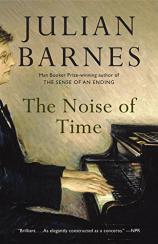The Noise of Time
Review
The Noise of Time
On September 25, 1906, Dmitri Dmitriyevich Shostakovich was born in Saint Petersburg, Russia. During his nearly 70 years on the planet, he grew to prominence as one of the top composers and pianists of the 20th century. It would be a serious understatement to claim that his rise to world-wide success was not without turmoil. Renowned author and Man Booker Prize winner Julian Barnes has selected Shostakovich and his unique struggle as the subject of his latest novel, THE NOISE OF TIME.
Barnes does more than pen a biography of Shostakovich --- he parallels his plight side by side with the rise of socialism and eventually communism in Russia. The chief antagonist of the story is the infamous Soviet leader Joseph Stalin. What THE NOISE OF TIME seeks to accomplish is to provide readers with all sides of the controversy surrounding the existence of art within a totalitarian state.
"Barnes elegantly glides through this slim novel, peppering it with concise prose and short paragraphs that all pack a punch."
The novel’s action takes off in the year 1936 amidst a world war and Stalin at the height of his power. During this time, Shostakovich was standing out as an immensely talented composer whose work was in demand, especially at a time of global strife. However, art and music were closely regulated by Soviet government, and one of Stalin's men, Zakrevsky, proved to be the antithesis of musical freedom in an age when every aspect of life was seemingly controlled.
Shostakovich realized he was a marked man when his first public piano concerto was covered in the pages of Pravda on January 28, 1936 --- a date he would celebrate for the rest of his life. Since all composers were employed by the state, it must mean that everything he created was their property. This was in direct confluence to his own ideology. Even though writers were in more danger than composers, Shostakovich never felt comfortable reporting to “the Power” that was overseeing all artistic products.
Paranoia took over as Stalin was quick to believe that everyone was plotting against him and that any artist --- be they using music or words --- was suspected of stirring up public sentiment against his leadership. A journey to America and a meeting with Igor Stravinsky proved to light the fire of musical freedom under Shostakovich, and he would return to Mother Russia a changed man.
The basic premise of the decades-long conflict between Shostakovich and the heavy thumb of despotism revolved around the definition of music and art. Art does not exist for art's sake but for the people's sake. In following this mantra, he embodied a form of artistic socialism that drove him through a life-long struggle to create his music for the people in spite of the necessity to represent the new Soviet Union as one of their own musical prodigies.
Barnes elegantly glides through this slim novel, peppering it with concise prose and short paragraphs that all pack a punch. Shostakovich is depicted as a man, a hero, a victim, and eventually a victorious fighter in the battle between art and those who seek to limit it through suppression and fear. THE NOISE OF TIME presents us with the life of a musical genius who overcomes his challenges and leaves his music behind as a gift for all the world to share.
Reviewed by Ray Palen on May 13, 2016
The Noise of Time
- Publication Date: June 13, 2017
- Genres: Fiction, Historical Fiction
- Paperback: 224 pages
- Publisher: Vintage
- ISBN-10: 1101971185
- ISBN-13: 9781101971185











